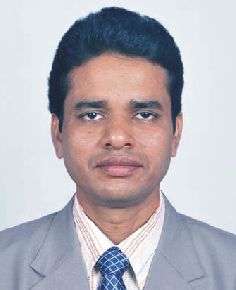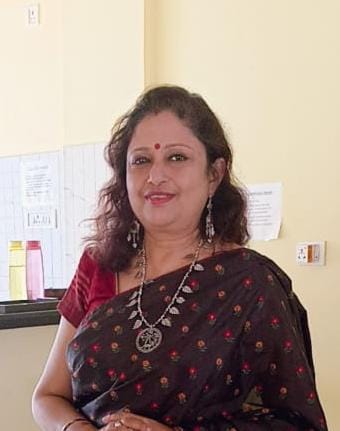Department of Ecological Studies
-150x150.jpg)
Professor(Dr.) Jayanta Kumar Biswas
Head of the Department Professor-

Departmental E-mail Address
Department of Ecological Studies is a young and dynamic Department of University of Kalyani under the Faculty of Engineering, Technology and Management which is striving to become a centre of excellence for upholding academic and research interests. The department came into existence in 2010 to offer M.Tech. and M.Sc. course in Environmental Management from the academic session 2010-2011, which is the “first-of-its-kind” in Eastern India. It has its root in International Centre for Ecological Engineering (ICEE) which was set up in the University of Kalyani in collaboration with the International Ecological Engineering Society, Switzerland in 2003 to carry out research, training and extension activities on different aspects of environment degradation. ICEE has made remarkable strides in research at the national and international arena with implementation of many major research projects funded by CSIR, DST, DBT, ICAR, GTZ (Germany), TTZ (Germany), Eco-san (European Commission), etc. ICEE has carved a niche in the international arena by making substantial contribution and cutting-edge research. As a noteworthy international recognition in water research, the ICEE has become a partner of the Global Water Partnership, Stockholm, Sweden which is regarded as a prestigious recognition in water sector in the world) with effect from November 1, 2006.
Since its inception the pragmatic focus of the Department has been on both teaching and research. The department endeavors to provide leadership in environmental management for promotion of innovative and effective solutions to environmental problems in our continuing journey of sustainable development. Our Master Programmes cut across traditional subjects and disciplines and truly multidisciplinary, integrative and dynamic field that recognizes the urgency of the current environmental challenges and enormous opportunities that may lead to transformative change. It stimulates interest in performing research to move this exciting field forward with new insights. This programmes evolve best equipped to guide higher learning into a challenging world demanding a holistic approach to environmental problem solving, pollution control and resource management. Our educational philosophy emphasizes learning the science and technology of environmental management as a foundation for proficient and innovative practice. Interactive classroom lectures are augmented by hands-on laboratory sessions, training and research experience. Students are encouraged to apply knowledge outside of the classroom, hone their skills, go on fieldtrips and participate in community services.
Hence, the objective of the courses is to develop adequate knowledge and skill for the would-be environmental managers and/or environment scientists through proper teaching-learning, hand-on training, field survey, industrial training and exposure to environmental problems of major industries for management options. By offering a portfolio of exciting post graduate compulsory and elective papers that serve as a gateway to exciting career options the courses impart a well-rounded education and training in all aspects of environment management and cutting-edge technology designed to prepare students for exciting career opportunities in academic, R&D as well as non-government agencies (NGO) working with environmental management and related issues.
Programmes offered
| Sl. No. | Programme | Duration | Intake capacity | Admission criteria |
|---|---|---|---|---|
| 1 | M.Sc | 02 Years | 35 | Admission Test & Merit |
| 2 | Ph.D | 05 Years | 22 | Admission Test & Merit |
| 3 | Certificate Course on “Water and soil qualities monitoring and environmental management” | 6 Month | 10 | As authority recommends |
Faculty Profile(Alphabetical Order)

.jpg)

.jpg)

Department Details
- Environmental pollution and ecoremediation
- Ecological engineering in environmental remediation
- Wastewater treatment
- Aquatic nutrients management
- Application of ecotechnology
- Ecotoxicology and environmental health
- Environmental microbiology & metagenomics
- Environmental impact assessment
- Nano technology in environmental monitoring
- Chemo sensor development
Department of Ecological Engineering & Environmental Management has adequate number of classrooms and laboratories equipped with required instruments, audio-visual system and computer facilities. The Department has moderate collection of literature, books and periodicals. Rich wealth of knowledge and information is available in the Central Library of our University in the form of numerous texts and reference books as well as related journals and periodicals.
Department of Ecological Studies has two laboratories for Master’s students and two research laboratories for research students equipped with different equipments, the major ones are stated below:
- AAS, 2. DGEE, 3. Stereo Zoom Microscope, 4. Inverted Microscope, 5. Bionocular Microscope, 6. Compound Light Microscopes, 7. Cooling Centrifuge, 8. BOD shaker incubator, 9. Auto claves, 10. Digital Balance, 11. Altimeter, 5. Chlorophyl Sensor,12. Colony Counter, 13. Hot Air Oven, 14. Kjeldhal Digestion Unit, 15. Automatic Nitrogen/Protein Estimation Unit, 16. Laminar Air Flow, 17. Sound Level Meter 18. High Volume Air Sampler, 19. COD Analyser 20. Muffle Furnance, 21. Deep freezer (-20oc), 22. Magnetic Stirrer, 23. UV Spectrophotometer, 24. Soil Grinder, 25. Solar Cooker, 26. Vacuum Manifold, 27. PH pocket Tester, 28. Water Quality Multiparameter Analyser , 29. Gel Apparatus & Powerpack, 30. Microtome, 31. CO2 incubator, 32. Micropipette, 33. UV Transluminator, 35. Membrane Filtration Unit, 36. Micropipette, 37. UV Transluminator, 38. Dry Thermostat Reactor, 39. Water Jacketed CO2 Incubator, 40. Orbital Shaker, 41. Water Bath, 42. Vortex Shaker, 43. Hotplate
- Ongoing:i. “Wetland ecosystem stress assessment through assay of microbial nutrient cycling and fish anti-oxidant enzymes” of rupess 14 Lakhs funded by WBDSTB. (PI: Dr. Susmita Lahiri(Ganguly))ii. UGC- BSR Startup Grant of Rupees 10 Lakhs (Dr. Sushil Kumar Mandal).
- Completed:i. “Development of novel pollutant detoxifying probiotic-fish feed using metagenomic marker probiotic and regional prebiotic food bio-resource” of rupess 9.998 Lakhs funded by WBDSTB. (PI: Dr. Jatindra Nath Bhakta)ii. Safeguarding Water resources in India with Green andSustainable technologies – SWINGS (EU-India project) (PI: Dr. Susmita Lahiri(Ganguly))
- Full Time: 10
- Part Time: 07
- Two Days National Seminar on Advancement in Green Technology for Controlling and Managing Current (March 22-23,2018)
- Two Days National Seminar on “Waste Management for Greener and Cleaner Environment” organized by University of Kalyani, India (March 25-26, 2018)
- 21 Days Summer Training Programme on “Health Vs Environment and Nutrition” organized (July 02 – 22, 2019)
- International webinar on “Environment-food-health nexus under changing global scenario” (September 06 and 07, 2021)
- One day international webinar on Food and Nutrition Vs COVID-19” (July 24, 2020)
- International Conference on “Integrated approaches towards sustainable management of environment for safe food, nutrition and improved health” (December 15-17, 2021)
- Student’s Freshers Welcome ceremony on 7th March,2022
- Student’s Farewell Ceremony on 7th March,2022
The department signed MoU with Gyeongsang National University, Jinju, Korea
The department also has collaborations of individual teachers as follows:
- Jayanta Kumar Biswas has research collaboration with (1) Prof. Yong Sik Ok, Korea University, Korea; (2) Laureate Professor Ravi Naidu, CRC CARE (Cooperative Research Centre for Contamination Assessment and Remediation of the Environment), University of Newcastle, Callaghan NSW 2308, Australia; (3) Prof. Filip M. G. Tack, Ghent University, Ghent, Belgium; (4) Prof. Erik Meers, Department of Applied Analytical & Physical Chemistry, Ghent University, Belgium; (5) Prof. Meththika Vithanage, University of Sri Jayewardenepura, Sri Lanka; (6) Prof. Dibyendu Sarkar, Civil, Environmental, and Ocean Engineering Department, Stevens Institute of Technology, Hoboken, New Jersey, US; (7) Prof. Amit Bhatnagar, Department of Separation Science, LUT University, Finland; (8) Dr Binoy Sarkar, Lancaster Environment Centre, Lancaster University, Lancaster, UK
- Jatindra Nath Bhakta has research collaboration with (1) Griffith University, Australia, (2) Parc Científic i Tecnològic de la Universitat de Girona, Spain, (3) University of Manchester, UK, (4) Okologische Gewassersanierung GmbH, Germany, (5) Laboratorio di Cagliari del Consorzio INCA, Italy, (6) National Academy of Science, Ukraine, (7) Universiti Sains Malaysia, Malaysia, (8) VNU University of Science, Vietnam and (9) Gheorghe Asachi Technical University of Iasi, Romania
- Susmita Lahiri(Ganguly) has research collaboration with (1) Dr. D. Sarkar, Chandernagore College, Hooghly, West Bengal, India, (2) Dr. K. Das, Senior Scientific Officer, West Bengal State Council of Science and Technology, Kolkata. (3) M. Rolletschek, SolarSpring, Germany (4) Prof. N. Khalil, Aligarh Muslim University (AMU), UP, India (5) Prof. V. K. Mishra, Indira Gandhi National Tribal University (IGNTU), MP, India (6) Dr. C. Jorgensen, DHI Group, Denmark (7) Dr. C. A. Arias, Department of Bioscience, Aarhus University, Denmark (8) Prof. S. K. Das, Department of Aquaculture,University of Animal and Fishery Sciences, West Bengal, India (9) Dr. S. Chatterjee, Nabadwip Vidyasagar College, West Bengal, India. (10) Prof. A.K. Panigrahi, Pro Vice-Chancellor, Burdwan University, (11) Dr. Bivash Guha, Department of Zoology, School of Sciences, Netaji Subhas Open University, West Bengal (12) Phillip Otter, Outrac On, Germany
- Sushil Kumar Mondal has research collaboration with (1) Prof. Prabitra Chatterjee, Department of Chemistry, The University of Burdawn, (2) Dr. Koushik DharaLuvpur College, Birbhum and (3) Prof. Partha Roy, Department of Chemistry, Jadavpur University
- Jayjit Majumdar has research collaboration with Dr. AL. Ramanathan, Professor, Environmental Geology, Hydrogeochemistry, Biogeochemistry & Glaciology Laboratory,
Jawaharlal Nehru University








